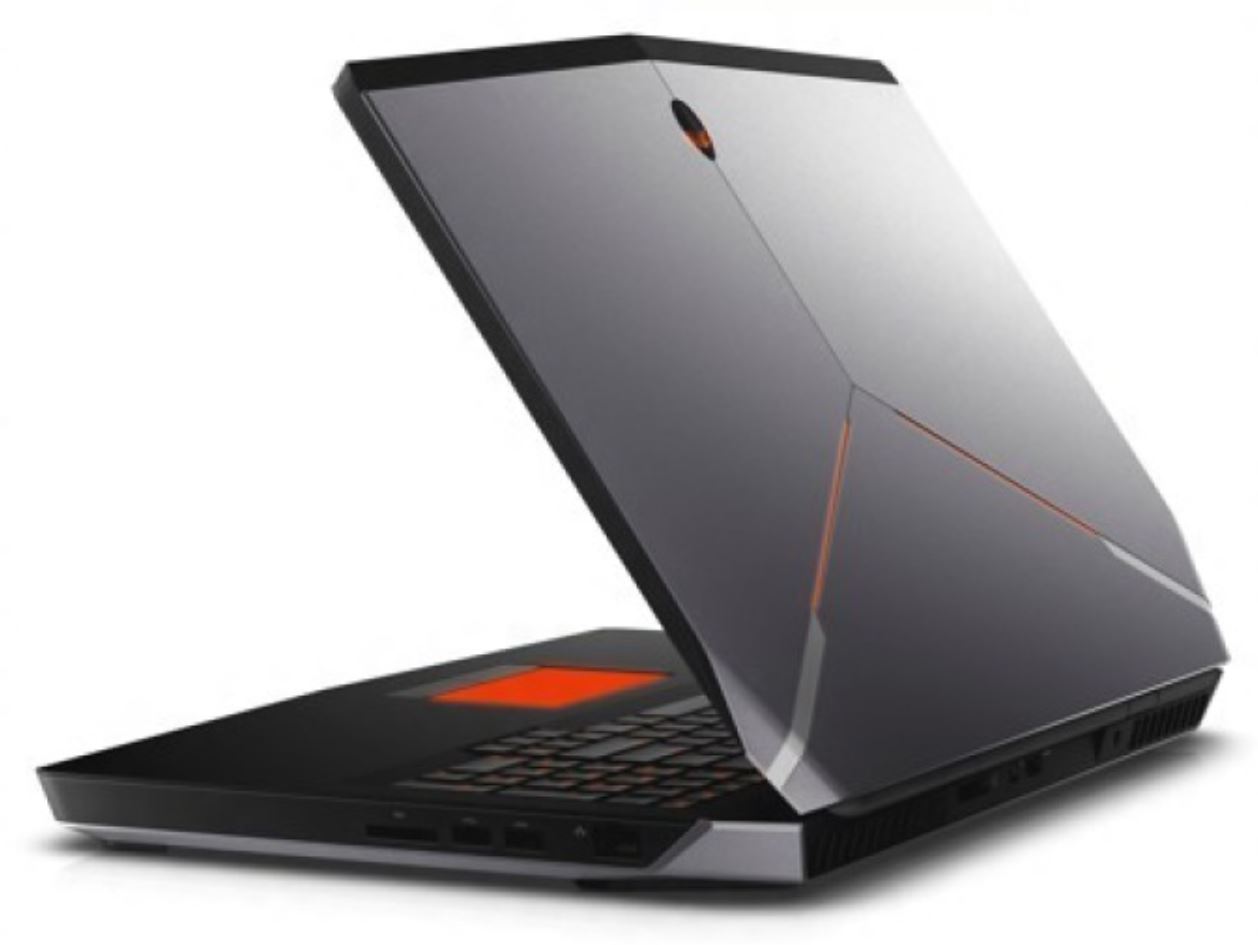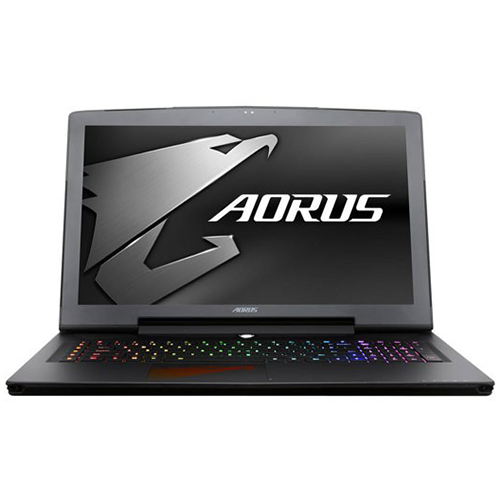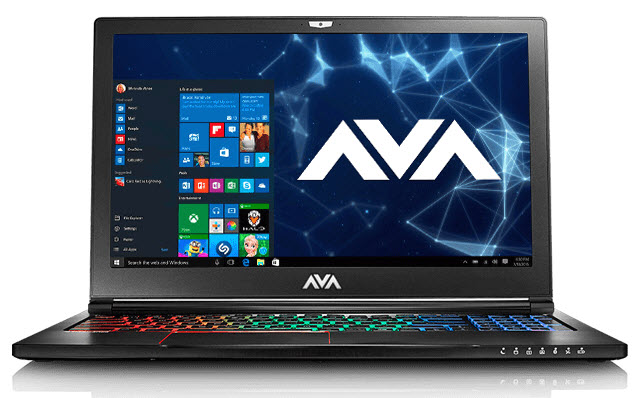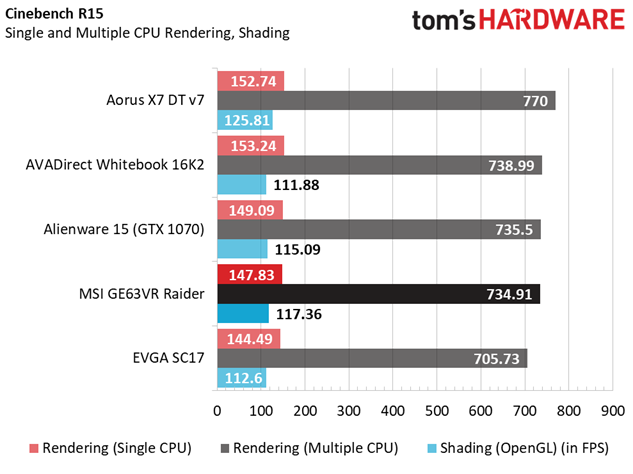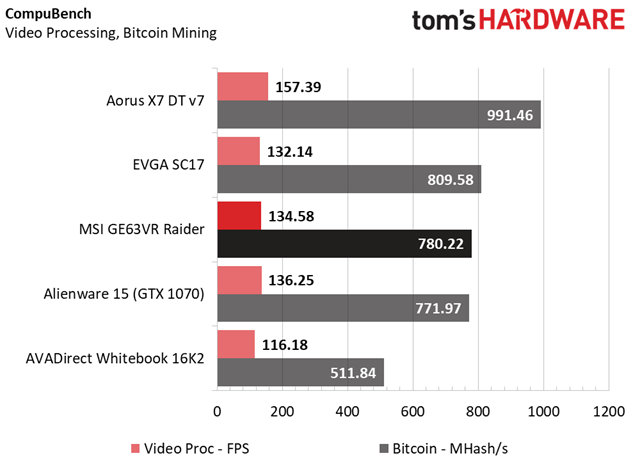MSI GE63VR Raider Gaming Laptop Review
Why you can trust Tom's Hardware
Synthetic Benchmarks
The MSI GE63VR Raider features an Nvidia GeForce GTX 1070, an Intel Core i7-7700HQ, a 512 GB M.2 SSD, and a 1TB 7200RPM HDD. It also has 32GB of DDR4-2400 memory, up from the 16GB we usually encounter on gaming laptops. Its 15.6” Full HD (1920x1080) matte display has a 120Hz refresh rate, although it isn’t an IPS panel. We’ll see how much this affects the display’s color and grayscale accuracy.
The Alienware 15 is our closest comparative match. It also contains a GTX 1070 and an i7-7700HQ. It features a more modest 16GB of DDR4-2400 memory, a 256GB M.2 SSD, and a 1TB 7200RPM HDD for additional storage. It also doesn’t have an IPS panel. Rather, it has a 15.6” FHD matte TN panel with 120Hz refresh rate, and the display includes G-Sync.
We’re also including the EVGA SC17, a laptop we reviewed a few months ago. Unlike the systems in this roundup, the SC17 uses last generation’s i7-6820HK, but that is paired with the GTX 1070. That CPU is overclockable, of course, so it will be interesting to see where these systems do battle; we have yet to test a GTX 1070-based system paired with a current generation i7-7820HK. The EVGA is equipped with 32GB of DDR4-2667 memory, a 256GB M.2 SSD, and a 1TB HDD. It has a more premium 17.3” Ultra HD (3840x2160) IPS display.
To illustrate the performance gap between these laptops, and one featuring a step down in graphics horsepower (GTX 1060), we’ve added the recently reviewed AVADirect Whitebook 16K2. It has an i7-7700HQ, 16GB of DDR4-2400 memory, a 250GB M.2 SSD, and a 1TB HDD to store large files. It features a fairly standard 15.6” FHD matte IPS display.
Finally, for comparisons at the high-end we’re throwing in the Aorus X7 DT v7, a sleek 17” laptop with a powerful GTX 1080; that review will be published shortly. The Aorus has an i7-7820HK CPU, 16GB of DDR4-2400 memory, a 512GB M.2 SSD, and a 1TB HDD. It’s display is a Quad HD (2560x1440) matte TN panel with a 120Hz refresh rate and G-Sync technology. This is a truly high-end laptop, and you can expect it best the competition in the majority of our benchmarks, but it's also significantly more expensive than the rest.
We expect the MSI GE63VR Raider to match the Alienware 15 and EVGA SC17 in gaming performance, but the SC17 should slightly overtake those two in CPU-reliant tasks. The main difference you’ll find between the three will likely come down to storage performance.
3DMark
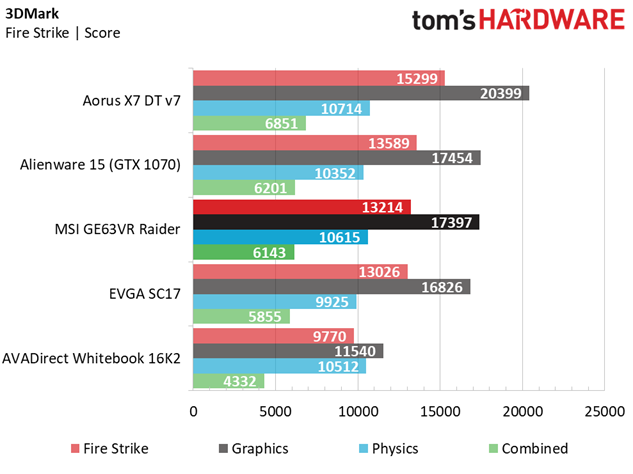
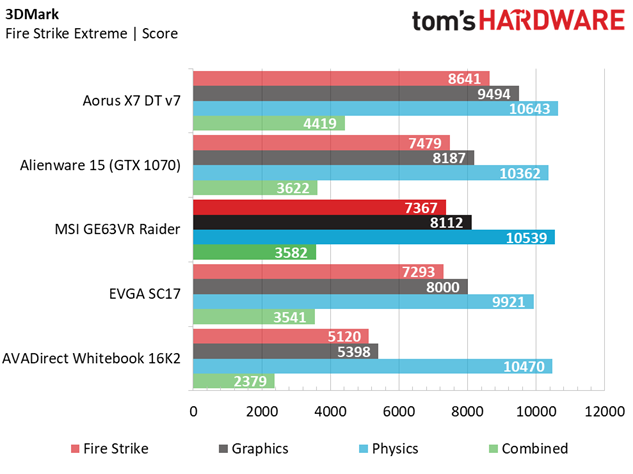
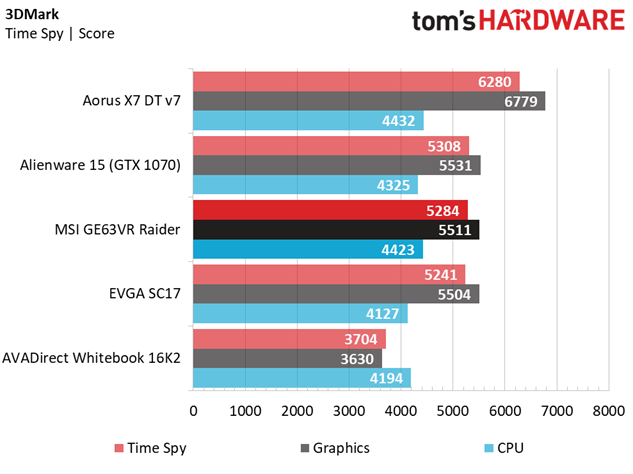
3DMark features a handful of benchmarks with different scenes, which individually test a system’s GPU and CPU prowess. The MSI GE63VR Raider and Alienware 15 both produce similar scores because of their near identical components. Also, all laptops with i7-7700HQs produce better physics scores than the EVGA SC17 with its i7-6820HK.
Get Tom's Hardware's best news and in-depth reviews, straight to your inbox.
Cinebench R15
If 3DMark is to be considered the standard for graphical synthetic tests, then we consider Cinebench R15 to be the standard for synthetic processor testing. The single and multi-core tests measure the system’s CPU muscle, while the OpenGL shading test exercises the entire platform, with a slight edge given to powerful GPUs.
Cinebench paints a similar picture to 3DMark, with the 7700HQ-based laptops producing higher single and multi-core results than the SC17. This also means that the Raider only scores about as well as the Whitebook and Alienware systems. Meanwhile, the more powerful Aorus X7 DT v7 scores slightly higher--by about 3% and 5% in single core and multi-core performance, respectively.
CompuBench
CompuBench features a CPU-based Video Processing test and a GPU-based Bitcoin Mining test. Once again, the MSI and Alienware score similarly, with only 1% variance in scores for both tests. The GTX 1070 pulls the Raider ahead of the GTX 1060-based Whitebook by a considerable 14% margin in Video Processing, and a wider 33% gap in Bitcoin Mining. Unfortunately for the Raider, the EVGA’s i7-6820HK delivers better scores all around, and the Aorus’s GTX 1080 scores even higher.
IOMeter
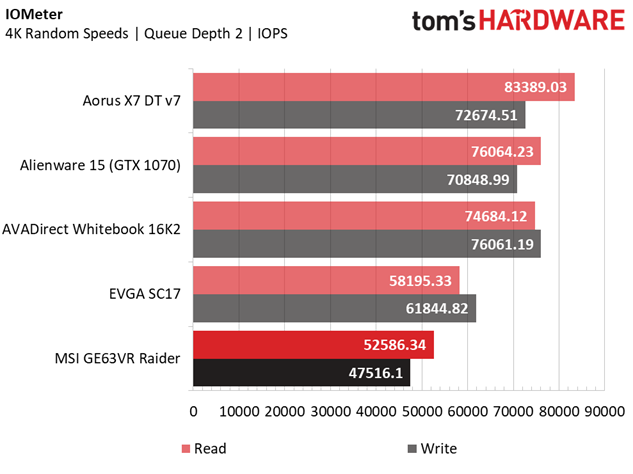
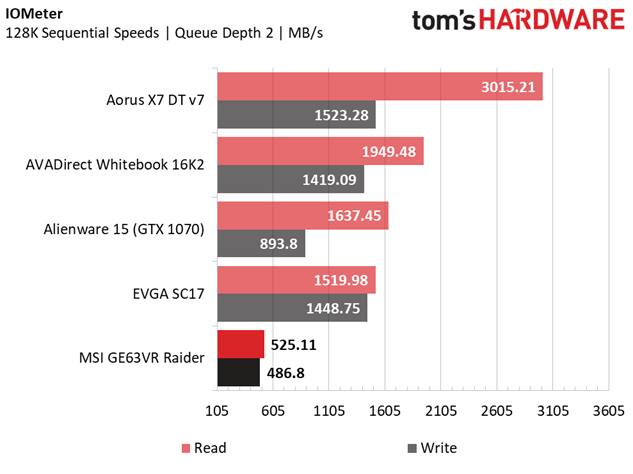
We perform an IOmeter test on each laptop’s primary drive to measure basic random and sequential read and write speeds. The Raider contains a 512GB Samsung PM871; this is the first time we've encountered one in a gaming laptop. The Aorus contains the more common 512GB Samsung SM951, the Whitebook utilizes a 250GB Samsung 960 EVO, the Alienware 15 has a 512GB Samsung PM961, and the EVGA SC17 uses a 256GB Toshiba XG3.
The Raider's PM871 delivers decent 4K random speeds at QD2, but loses out to its competitors, even the notably slow XG3. The PM871 fares even worse in sequential speeds, delivering speeds well under 1,000 MB/s. This is a poor choice of components for a gaming laptop at this price point.
PCMark 8
To approximate a system’s common workday performance, we use PCMark 8’s Microsoft Office and Adobe Creative tests. The tasks are platform-based, so systems with powerful CPUs tend to perform better here.
The MSI GE63VR Raider scores about as well as the Alienware and AVADirect in both Creative and Office tests, thanks in no small part to the current generation mobile i7 CPU. The Aorus scores slightly better thanks to its beefier hardware overall, while the EVGA drags behind. However, these differences are minor and you likely won't perceive much of a difference in real world Adobe Creative and Microsoft Office tasks.
MORE: Best Gaming Laptops
MORE: Gaming Laptop Previews
MORE: All Laptop Content
Current page: Synthetic Benchmarks
Prev Page Introduction & Product Tour Next Page Gaming Benchmarks-
sammseven Great and very complete review!Reply
I'll buy this laptop, since I can find it for 1700€ in my country with the 16gb RAM and 1070 graphics.
Thank you for this great job in this review! -
Ninjawithagun Definitely a much better hardware layout compared to my Asus G701VI-XS72K, and is therefore much easier to upgrade components. But as far as performance, my G701V still destroys the MSI GE63VR. I paid just $2165 for my laptop and it has a GTX1080 and a 120Hz G-Sync screen. The MSI GE63VR only has a GTX1070 and 120Hz display with no G-Sync. I suppose it's tid-for-tad on what the individual consumer wants to spend vs. what they get and how easy it is to upgrade in the future.Reply -
ledhead11 I have to totally agree Ninjawithagun. I think I read about the release of that Asus about a year ago and thought. . .finally a perfect match. Agreed, a bit high on the price but the GPU/Display match is perfect. Looking at these benchmarks for the 1070, ultra settings are a near disaster for demanding games and tearing will be inevitable. They really should've had a g-sync to at least compensate.Reply
The nice thing too about that Asus is that it will hold its own for years to come for 1080p gaming while present day games can start to pull down a 1070 from even hitting 80fps let alone 120fps.
At this point MSI is more about marketing hype and jacking prices than performance. Like many they throw the 'gaming laptop' and state CPU/Ram specs then try to shine how they've consistently mismatched their displays and gpus. A good example are how many of their sli rigs were matched with 1080/60hz before they even began to intro something else.
Honestly, sammseven, if you're truly looking into getting something like this then look a little higher at someting like that Asus. There's a reason the MSI was at the near bottom for most of these benches and I do agree this is a good review too. -
darth_adversor Just my opinion, but I think $2,300 is an astronomical amount of money to spend on a gaming laptop. For that much money, it shouldn't have any major deficits, and yet, no G-Sync?Reply
Honestly, it still wouldn't be a great buy even with G-sync, as you can get into a 1080 for about the same price, but come on... -
JAVI LIP I'm really angry at MSI. I bought a laptop GE60 2PL three years ago and the motherboard has failed. I had a laptop from other vendor and I didn't have any trouble for 11 years.Reply -
sillysoft Back in 2013 I bought my very first laptop, it was a MSI G Series GT70 2OD-039US. I still use it to this day, Im on it right now. Im in the market for a new laptop though, all I can say is I wont be buying another MSI laptop. Though its lasted, I treated this laptop VERY well and it still broke on me. The keyboard broke, keys just stopped working, plastic broke off around the lid. The metal bars that allow the lid to open and close is exposed. I now have a external monitor on top of a stand with the laptop close with external KB/M, basically I use it as a desktop now. But it looked pretty cool at the time and the specs also looked "beefy". But I will never buy another laptop or desktop again without consulting with others first. Cant trust myself to make good decisions on this topic lolReply
Speaking of which, any suggestions on a new loaded laptop for $3k or less? Looking at the Asus G701VI-XS72K. -
ledhead11 I too had a bad MSI laptop experience. I went all in for a GT80 Titan 980mSLI. I got it through a re-seller with some upgrades that resulted in about a years worth of grief. Eventually I learned how to deal with the unique design of it and did my own upgrades after. It's been fine since but honestly at this point I'd never recommend another MSI laptop again. Their desktop stuff is great, otherwise-no.Reply
@sillysoft IDK if a TI mobile will be coming out or if one would happen below $3k. If it did I'd look at something like that. Otherwise, that Asus looks pretty solid. Hard thing is that there aren't many reviews for the 1080p/120hz/G-Syncs w/ 1080 GPU's. The 1070 ones are everywhere but pretty much useless for the money.
